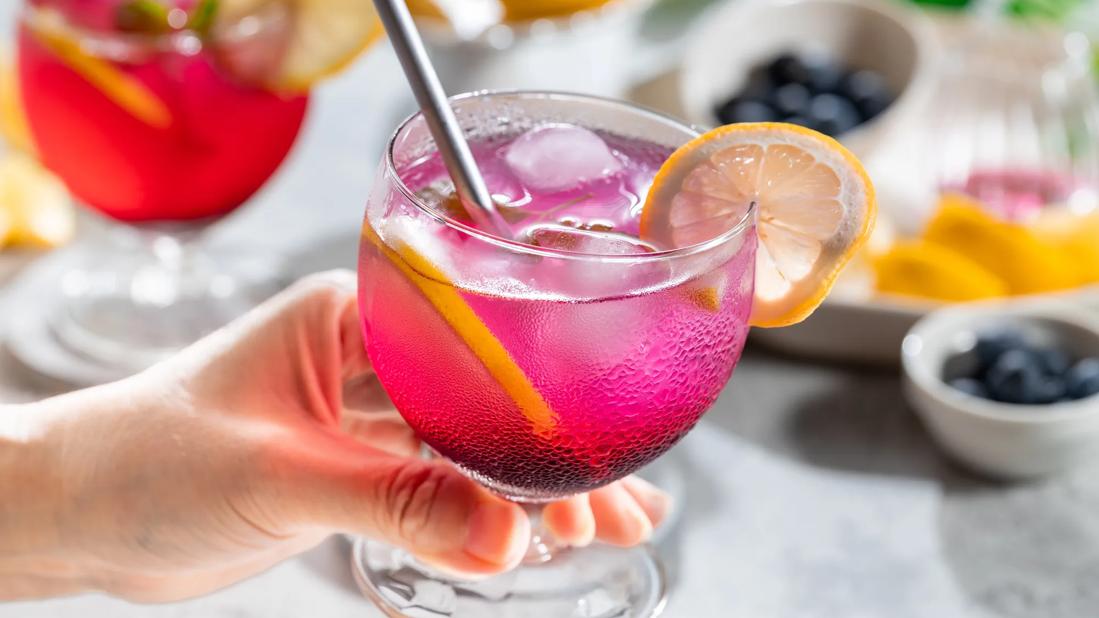Options for sober social drinking are abundant, but be mindful about additives and triggers

Image content: This image is available to view online.
View image online (https://assets.clevelandclinic.org/transform/28665630-de77-40e5-b526-46f4b2ffe015/mocktails-2175606068)
Hand holding glass of colorful beverage drinks and fruits in background
As more people are drinking less alcohol, there’s been an uptick in mocktails and nonalcoholic options.
Advertisement
Cleveland Clinic is a non-profit academic medical center. Advertising on our site helps support our mission. We do not endorse non-Cleveland Clinic products or services. Policy
And there are many reasons why you may skip that beer or cocktail. Maybe you’re in recovery or you’re pregnant. Perhaps you’re sober-curious, starting a new medication that doesn’t mix with alcohol or finding that drinking is having a negative impact on your health.
Whatever your motivation, it can still be tough to figure out if these options are healthy.
Think of it as a cocktail without the alcohol. A variety of ingredients like tea, syrups, sodas and juices are used in place of alcohol to resemble the taste and appearance of a cocktail, says registered dietitian Beth Czerwony, RD, LD.
Here are some things to consider as you navigate mocktails and other nonalcoholic drinks.
Certain beer and wine options are produced without alcohol, making them nonalcoholic. These can be especially helpful if you’re trying to slowly transition away from drinking and want to comfortably socialize (without anyone asking unwanted questions about your drink choice).
“You may have social stressors when you’re with a group of friends and they’re all drinking,” recognizes Czerwony. “And maybe you don’t want to just be drinking a soda. So, nonalcoholic beers and wines might be one good option to help wean yourself away from alcohol.”
Advertisement
Virgin cocktails or mocktails are drinks that have all the building blocks of well-known cocktails, minus the alcohol. If you’re interested in trying these, you can simply ask for a “virgin” version of your favorite cocktail.
“If you wanted to do a virgin version of something like a mojito or daiquiri, you’re still getting the feel of having a cocktail, but you’re not getting the alcohol,” Czerwony says.
You can also buy premade mocktails in most stores. These are often carbonated or noncarbonated drinks that have similar mixtures to cocktails but without the alcohol content. A lot of these are a good option if you’re trying to experiment with different flavors and want to add a bit of spice to your sober lifestyle.
Just because a drink is nonalcoholic doesn’t mean it’s 100% healthy. Here’s what to watch out for:
Cutting out alcohol from your social beverages is a definite plus when it comes to living a healthier lifestyle, but are there any other benefits to nonalcoholic options? As Czerwony points out, it all depends on the brand and type you go for, as well as what your usual intake of alcohol is.
In general, cutting down on alcohol can reduce your risk for:
Keep in mind your own history with alcohol. Whether you’re currently going through recovery or you’re serving a friend at dinner, it’s essential to be sensitive to any triggers.
For example, even though there are a ton of tasty mocktails out there, the ones that are modeled after alcoholic cocktails (think: a virgin mojito) can possibly trigger someone into relapse. Czerwony cautions that if you’re worried about going down a slippery slope with certain drinks, you should seek out other alternatives.
Most healthcare providers and physicians will tell you that cutting down on alcohol is a good thing. So, if you’re trying to explore an alcohol-free lifestyle, know that there are many benefits for your health and mental well-being. And there are many alternative drink options out there to help you.
Advertisement
“I think the bottom line is if you don’t drink, don’t start,” advises Czerwony. “And if you feel like you need to cut down, you probably should.”
If you think you’re having trouble managing your drinking, there are other tools that you can try. And if you’re not sure about what nonalcoholic drinks are best for your overall health, it’s never a bad idea to check in with a doctor.
Advertisement

Sign up for our Health Essentials emails for expert guidance on nutrition, fitness, sleep, skin care and more.
Learn more about our editorial process.
Advertisement
Pickle juice has a reputation as a probiotic powerhouse, workout recovery aid, hangover cure and more
If you’re looking to boost your gut health, it’s better to get fiber from whole foods
While it isn’t bad for you, celery juice isn’t the detox phenom it’s claimed to be
Regularly drinking these sugar-fueled, stimulant-laden beverages can increase your risk of adverse health effects
This spicy concoction can do more harm than good, upsetting your stomach and causing painful acid reflux
Juicing removes beneficial fiber from fruits and veggies and raises your blood sugar
Sports drinks can give your body a boost, but it’s important not to overuse them
Guarana seeds may have benefits, but the potential is lost in processing
Prioritize your health by managing stress, strengthening your social connections and getting quality sleep
Bolsters, blankets, pillows and blocks can offer extra support, stability and comfort
Allergies, postnasal drip, asthma or reflux could be to blame for a cough that won’t quit